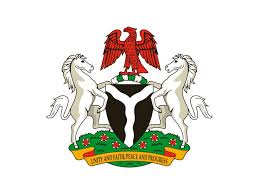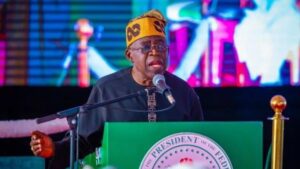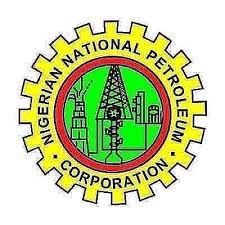Use Dr. Fraser. FI.
inauguration photo of Tinubu, image or head office photo for CBN, NNPCL , Min of Finance, logo for Aviation, Education, Digital Economy, Foreign Affairs, World Bank, IMF logo. National Patriots flyer.
Two years into the administration of President Bola Ahmed Tinubu, Nigeria is experiencing a period of reform more far-reaching than anything seen in the past decade. Whether Nigerians fully agree with the pace or feel the bite of the transition, the reality is simple: this administration has gone straight for the structural issues that many of its predecessors avoided. The result is a mix of bold reforms, renewed international engagement and visible shifts in national direction. Below is an editorial capturing the 12 defining achievements that have shaped Tinubu’s first two years.

1. Ending the Era of Distortions: Fuel Subsidy Removal & FX Unification
The removal of the petroleum subsidy and the unification of Nigeria’s multiple foreign-exchange windows represent the administration’s most defining economic interventions. These decisions freed enormous fiscal resources and injected long-absent transparency into the FX market. The country finally stepped away from a system that enriched middlemen and punished productivity. Painful? Yes. Necessary? Undeniably.
2. A Stronger Fiscal Base Through Revenue Expansion
Nigeria has historically depended on oil for survival. Tinubu’s government has pushed the nation toward a new reality by improving tax administration, embracing digital revenue systems and expanding the non-oil tax base. With a climbing tax-to-GDP ratio and a reduced debt-service burden, the country now operates on a firmer financial foundation.

3. Reserves and External Accounts Regaining Stability
After years of pressure on reserves and external balances, Nigeria has seen a turnaround. Stabilised FX reserves and a return to balance-of-payments surplus point to greater macroeconomic stability and revived confidence among global financial institutions.
4. Returning the Economy to Growth
Despite inflation and adjustment pains, Nigeria’s GDP growth has pushed upward. Investment interest is rebounding, capital projects are restarting, and the economy is gradually climbing out of stagnation. It’s not a miracle—just the early signs of structural recalibration.
5. Social Investment with Wider Reach
Millions of Nigerians now benefit from expanded cash-transfer programmes and household support initiatives. Unlike previous cycles of social spending, the current approach focuses on direct, digital delivery to citizens. It’s a move toward people-centred governance, especially amid economic transition.

6. A More Modern Education System: Loans, Curriculum Reform & Digital Exams
Tinubu’s education reforms rank among the most significant in recent years. Key changes include:
A national student-loan scheme that breaks financial barriers for young Nigerians.
A curriculum overhaul targeting employability, digital literacy and global alignment.
Digital transformation of examination bodies, reducing malpractice and improving efficiency.
Nigeria’s future depends on its human capital—this administration is investing where it matters.
7. Infrastructure Revival & Regional Development Commissions
The Lagos–Calabar Coastal Highway is the flagship, but the story is bigger. New regional development commissions have been launched across all six zones, helping ensure that infrastructure investment is not Lagos–Abuja-centric. For the first time in a long time, planning and execution are both nationally ambitious and regionally targeted.
The aviation sector has also seen modernisation, with upgrades to key airports and operational improvements that support safer, more efficient domestic and international travel—an important enabler for business, tourism and diaspora links.
8. Security Gains in Previously Volatile Areas
Nigeria’s security landscape is far from perfect, but progress in several hotspots is undeniable. Examples include:
Southern Kaduna,
Parts of Niger State,
Kogi corridors,
Benue farming belts.

Roads have reopened and farmers are returning to lands once overrun by bandits. Community-based peace structures established across more than 120 LGAs have become the backbone of these improvements.
In parallel, the government has strengthened counterterrorism partnerships and approved the highest defence budget in Nigeria’s political history, signalling seriousness about confronting insurgency and terrorism. Correctional centres are being reformed to prevent the kind of repeated jailbreaks that previously emboldened criminal gangs. These measures do not end insecurity on their own, but they mark a decisive shift away from neglect and underfunding.
9. Innovative Healthcare: Youth Health Ambassadors & PHC Upgrades
The Health Fellows/Ambassadors programme employs hundreds of young health workers nationwide, creating a new model for primary-care delivery. Coupled with PHC upgrades, expanded health insurance coverage and new specialist facilities, the sector is finally seeing targeted and youthful energy. It is a rare example of a policy that simultaneously tackles health outcomes, youth employment and community presence.
10. A Surging Digital Economy
Nigeria’s digital ecosystem is expanding fast:
More Nigerians are earning income from remote global jobs.
Online entrepreneurship, fintech and content creation are booming.
Reforms in Customs, Ports, Shipping and Oil & Gas are cutting corruption, delays and inefficiency.
In addition, the immigration sector has been digitalised, with electronic check-in systems at airports and a modern, secure passport production line designed to make passports more available and reduce processing bottlenecks. This quiet digital revolution—public and private—is reshaping productivity and youth opportunities.
11. Renewed Global Standing & Foreign Investment Attraction
Nigeria has re-entered serious global economic and diplomatic discussions. Engagement with the G20, AU–EU platforms, multinational investors and technology partners reflects a country reasserting its relevance. Foreign companies are exploring opportunities in manufacturing, technology transfer, agro-processing and energy.
Under Tinubu, Nigeria has also gained more strategic allies. Countries like Brazil, China and Russia are all expressing stronger interest in building or deepening relationships with Nigeria—drawn by its market size and its vast natural endowments. The country holds huge gas reserves running into trillions of cubic feet, as well as a commendable base of rare earth minerals and gold. By opening up the policy space and signalling readiness for business, the administration has positioned Nigeria as a preferred destination for investors in energy, mining, infrastructure and technology.
Tourism and soft power are part of this repositioning. In December 2024, Nigeria emerged as a major global festive hotspot, with the “Detty December” season drawing huge numbers of visitors and bringing in millions of dollars in revenue—a first at this scale in the country’s history.
However, to fully reap the benefits of this investment and tourism drive, insecurity must be addressed decisively and urgently. Investors and visitors follow opportunity, but they also follow safety.
12. Diversification Through Agriculture & Solid Minerals
From agro-processing plants to reforms in solid-minerals governance, the administration is pushing Nigeria away from dependence on crude oil. The goal is clear: diversify the economy, create jobs and build resilience. Properly executed, these efforts could re-anchor Nigeria’s growth in value-added production rather than raw commodity exports.
Final Word
Whether one agrees with every policy or not, Tinubu’s first two years have been defined by structural change, not cosmetic adjustments. The administration has taken risks, broken long-standing political taboos and attempted to fix deep national problems. The real test lies ahead—turning reforms into broad-based prosperity—but the trajectory is unmistakably different.
Nigeria is being repositioned, and the foundation for long-term transformation is finally being laid.
Princess G. A. Adebajo-Fraser MFR.
The National Patriots Movement.



